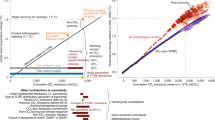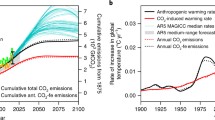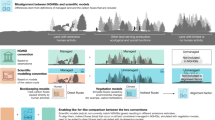Abstract
Purpose of Review
Here, we review recent estimates of the remaining carbon budget, with a focus on characterizing key uncertainties and assessing the implications for net-zero CO2 targets and climate policy.
Recent Findings
Recent analyses offer a range estimates of remaining allowable CO2 emissions for the 1.5 °C and well-below 2 °C climate targets, though the treatment and coverage of key sources of uncertainty vary considerably among studies. We recommend that net-zero CO2 targets be set with explicit recognition of the uncertainty associated with carbon budget estimates and be updated regularly as this uncertainty is better constrained. Allocating the remaining carbon budget among countries or other entities, as well as monitoring progress at the subnational level, represents additional key challenges in applying a carbon budget framework to climate policy.
Summary
Despite these challenges, recent advances in quantifying carbon budget uncertainty demonstrate that the concept is well-suited to inform climate policy and to evaluate whether net-zero CO2 targets are consistent with the goals of the Paris Agreement.


Similar content being viewed by others
References
Asayama S, Hulme M, Markusson N. Balancing a budget or running a deficit? The offset regime of carbon removal and solar geoengineering under a carbon budget. Clim Change. 2021;167:25. https://doi.org/10.1007/s10584-021-03174-1.
Matthews HD, Tokarska KB, Nicholls ZRJ, Rogelj J, Canadell JG, Friedlingstein P, et al. Opportunities and challenges in using remaining carbon budgets to guide climate policy. Nat Geosci. 2020;13:769–79. https://doi.org/10.1038/s41561-020-00663-3.
Rogelj, Shindell D, Jiang K, Fifita S, Forster P, Ginzburg V, et al. Mitigation pathways compatible with 1.5°C in the context of sustainable development. Spec Report, Intergov Panel Clim Chang. 2018. pp. 93–74. https://doi.org/10.1017/9781009157940.004.
Jones CD, Ciais P, Davis SJ, Friedlingstein P, Gasser T, Peters GP, et al. Simulating the Earth system response to negative emissions. Environ Res Lett. 2016;11:095012. https://doi.org/10.1088/1748-9326/11/9/095012.
Rogelj J, Forster PM, Kriegler E, Smith CJ, Séférian R. Estimating and tracking the remaining carbon budget for stringent climate targets. Nature. 2019;571:335–42. https://doi.org/10.1038/s41586-019-1368-z.
Rogelj J, Geden O, Cowie A, Reisinger A. Net-zero emissions targets are vague: three ways to fix. Nature. 2021;591:365–8. https://doi.org/10.1038/d41586-021-00662-3.
Tokarska KB, Zickfeld K. The effectiveness of net negative carbon dioxide emissions in reversing anthropogenic climate change. Environ Res Lett. 2015;10094013. https://doi.org/10.1088/1748-9326/10/9/094013.
Matthews HD, Gillett NP, Stott PA, Zickfeld K. The proportionality of global warming to cumulative carbon emissions. Nature. 2009;459:829–32. https://doi.org/10.1038/nature08047.
Meinshausen M, Meinshausen N, Hare W, Raper SCB, Frieler K, Knutti R, et al. Greenhouse-gas emission targets for limiting global warming to 2 °C. Nature. 2009;458:1158–62. https://doi.org/10.1038/nature08017.
Tokarska KB, Gillett NP, Weaver AJ, Arora VK, Eby M. The climate response to five trillion tonnes of carbon. Nat Clim Chang. 2016;6:851–5. https://doi.org/10.1038/nclimate3036.
Zickfeld K, Eby M, Matthews HD, Weaver AJ. Setting cumulative emissions targets to reduce the risk of dangerous climate change. Proc Natl Acad Sci U S A. 2009;106:16129–34. https://doi.org/10.1073/pnas.0805800106.
Canadell JG, Monteiro PMS, Costa MH, Cotrim da Cunha L, Cox PM, Eliseev A V, et al. Global carbon and other biogeochemical cycles and feedbacks. In: Masson-Delmotte V, Zhai P, Pirani A, Connors SL, Péan C, Berger S, et al, editors Clim Chang 2021 Phys Sci Basis Contrib Work Gr I to Sixth Assess Rep Intergov Panel Clim Chang, Cambridge University Press; 2021. pp. 673–816. https://doi.org/10.1017/9781009157896.007.
Gillett NP, Arora VK, Matthews HD, Allen MR. Constraining the ratio of global warming to cumulative CO2 emissions using CMIP5 simulations. J Clim. 2013;26:6844–58. https://doi.org/10.1175/JCLI-D-12-00476.1.
Collins M, Knutti R, Arblaster J, Dufresne J-L, Fichefet T, Friedlingstein P, et al. Long-term climate change: projections, commitments and irreversibility. In: Stocker TF, Qin D, Plattner G-K, Tignor M, Allen SK, Boschung J, et al, editors Clim Chang 2013 Phys Sci Basis Contrib Work Gr I to Fifth Assess Rep Intergov Panel Clim Chang, Cambridge, United Kingdom and New York, NY, USA: Cambridge University Press; 2013;1029–36. https://doi.org/10.1017/CBO9781107415324.024.
Caldeira K, Kasting JF. Insensitivity of global warming potentials to carbon dioxide emission scenarios. Nature. 1993;366:251–3. https://doi.org/10.1038/366251a0.
Matthews HD, Caldeira K. Stabilizing climate requires near-zero emissions. Geophys Res Lett 2008;35:L04705. https://doi.org/10.1029/2007GL032388.
Allen MR, Frame DJ, Huntingford C, Jones CD, Lowe JA, Meinshausen M, et al. Warming caused by cumulative carbon emissions towards the trillionth tonne. Nature. 2009;458:1163–6. https://doi.org/10.1038/nature08019.
Zickfeld K, Arora VK, Gillett NP. Is the climate response to CO2 emissions path dependent? Geophys Res Lett 2012;39:L05703. https://doi.org/10.1029/2011GL050205.
Matthews HD, Landry JS, Partanen AI, Allen M, Eby M, Forster PM, et al. Estimating carbon budgets for ambitious climate targets. Curr Clim Chang Reports. 2017;3:69–77. https://doi.org/10.1007/s40641-017-0055-0.
Rogelj J, Schaeffer M, Friedlingstein P, Gillett NP, van Vuuren DP, Riahi K, et al. Differences between carbon budget estimates unravelled. Nat Clim Chang 2016;6245–52. https://doi.org/10.1038/nclimate2868.
Millar RJ, Fuglestvedt JS, Friedlingstein P, Rogelj J, Grubb MJ, Matthews HD, et al. Emission budgets and pathways consistent with limiting warming to 1.5 °c. Nat Geosci. 2017;10:741–7. https://doi.org/10.1038/NGEO3031.
Tokarska KB, Gillett NP, Arora VK, Lee WG, Zickfeld K. The influence of non-CO2 forcings on cumulative carbon emissions budgets. Environ Res Lett. 2018;13:034039. https://doi.org/10.1088/1748-9326/aaafdd.
Tokarska KB, Schleussner CF, Rogelj J, Stolpe MB, Matthews HD, Pfleiderer P, et al. Recommended temperature metrics for carbon budget estimates, model evaluation and climate policy. Nat Geosci. 2019;12:964–71. https://doi.org/10.1038/s41561-019-0493-5.
Forster PM, Storelvmo T, Armour K, Collins W, Dufresne JL, Frame D, et al. The Earth’s energy budget, climate feedbacks, and climate sensitivity. In: Masson-Delmotte V, Zhai P, Pirani A, Connors SL, Péan C, Berger S, et al, editors Clim Chang 2021 Phys Sci Basis Contrib Work Gr I to Sixth Assess Rep Intergov Panel Clim Chang, Cambridge University Press. 2021. pp. 923–1054.
Gasser T, Kechiar M, Ciais P, Burke EJ, Kleinen T, Zhu D, et al. Path-dependent reductions in CO2 emission budgets caused by permafrost carbon release. Nat Geosci. 2018;11:830–5. https://doi.org/10.1038/s41561-018-0227-0.
MacDougall AH, Zickfeld K, Knutti R, Matthews HD. Sensitivity of carbon budgets to permafrost carbon feedbacks and non-CO2 forcings. Environ Res Lett. 2015;10:125003. https://doi.org/10.1088/1748-9326/10/12/125003.
Matthews HD, Tokarska KB, Rogelj J, Smith CJ, MacDougall AH, Haustein K, et al. An integrated approach to quantifying uncertainties in the remaining carbon budget. Commun Earth Environ. 2021;2:7. https://doi.org/10.1038/s43247-020-00064-9.
Mengis N, Partanen AI, Jalbert J, Matthews HD. 1.5 °c carbon budget dependent on carbon cycle uncertainty and future non-CO2 forcing. Sci Rep. 2018;8:5831. https://doi.org/10.1038/s41598-018-24241-1.
Nicholls ZRJ, Gieseke R, Lewis J, Nauels A, Meinshausen M. Implications of non-linearities between cumulative CO2 emissions and CO2-induced warming for assessing the remaining carbon budget. Environ Res Lett 2020;15:074017. https://doi.org/10.1088/1748-9326/ab83af.
Bowerman NHA, Frame DJ, Huntingford C, Lowe JA, Smith SM, Allen MR. The role of short-lived climate pollutants in meeting temperature goals. Nat Clim Chang. 2013;3:1021–4. https://doi.org/10.1038/nclimate2034.
Rogelj J, Meinshausen M, Schaeffer M, Knutti R, Riahi K. Impact of short-lived non-CO2mitigation on carbon budgets for stabilizing global warming. Environ Res Lett. 2015;10:075001. https://doi.org/10.1088/1748-9326/10/7/075001.
Goodwin P, Katavouta A, Roussenov VM, Foster GL, Rohling EJ, Williams RG. Pathways to 1.5 °C and 2 °C warming based on observational and geological constraints. Nat Geosci 2018;11. https://doi.org/10.1038/s41561-017-0054-8.
Tokarska KB, Zickfeld K, Rogelj J. Path independence of carbon budgets when meeting a stringent global mean temperature target after an overshoot. Earth’s Futur. 2019;7:1283–95. https://doi.org/10.1029/2019EF001312.
Huppmann D, Rogelj J, Kriegler E, Krey V, Riahi K. A new scenario resource for integrated 1.5 °C research. Nat Clim Chang. 2018;8:1027–30. https://doi.org/10.1038/s41558-018-0317-4.
Allen MR, Shine KP, Fuglestvedt JS, Millar RJ, Cain M, Frame DJ, et al. A solution to the misrepresentations of CO2-equivalent emissions of short-lived climate pollutants under ambitious mitigation. Npj Clim Atmos Sci. 2018;1:16. https://doi.org/10.1038/s41612-018-0026-8.
Collins WJ, Frame DJ, Fuglestvedt JS, Shine KP. Stable climate metrics for emissions of short and long-lived species—combining steps and pulses. Environ Res Lett. 2020;15:024018. https://doi.org/10.1088/1748-9326/ab6039.
Shine KP, Fuglestvedt JS, Hailemariam K, Stuber N. Alternatives to the global warming potential for comparing climate impacts of emissions of greenhouse gases. Clim Change. 2005;68:281–302. https://doi.org/10.1007/s10584-005-1146-9.
Shine KP. The global warming potential—the need for an interdisciplinary retrial. Clim Change. 2009;96:467–72. https://doi.org/10.1007/s10584-009-9647-6.
Rogelj J, Schleussner C-F. Unintentional unfairness when applying new greenhouse gas emissions metrics at country level. Environ Res Lett. 2019;14:114039. https://doi.org/10.1088/1748-9326/ab4928.
Schleussner C-F, Nauels A, Schaeffer M, Hare W, Rogelj J. Inconsistencies when applying novel metrics for emissions accounting to the Paris Agreement. Environ Res Lett. 2019;14:124055. https://doi.org/10.1088/1748-9326/ab56e7.
Jenkins S, Millar RJ, Leach N, Allen MR. Framing climate goals in terms of cumulative CO2-forcing-equivalent emissions. Geophys Res Lett. 2018;45:2795–804. https://doi.org/10.1002/2017GL076173.
Alcaraz O, Buenestado P, Escribano B, Sureda B, Turon A, Xercavins J. Distributing the global carbon budget with climate justice criteria. Clim Change 2018;149:131–45. https://doi.org/10.1007/s10584-018-2224-0.
Gignac R, Matthews HD. Allocating a 2°C cumulative carbon budget to countries. Environ Res Lett 2015;10:075004. https://doi.org/10.1088/1748-9326/10/7/075004.
Holz C, Kartha S, Athanasiou T. Fairly sharing 1.5: national fair shares of a 1.5 °C-compliant global mitigation effort. Int Environ Agreements Polit Law Econ 2018;18:117–34. https://doi.org/10.1007/s10784-017-9371-z.
van den Berg NJ, van Soest HL, Hof AF, den Elzen MGJ, van Vuuren DP, Chen W, et al. Implications of various effort-sharing approaches for national carbon budgets and emission pathways. Clim Change 2020;162:1805–22. https://doi.org/10.1007/s10584-019-02368-y.
Hultman NE, Clarke L, Frisch C, Kennedy K, McJeon H, Cyrs T, et al. Fusing subnational with national climate action is central to decarbonization: the case of the United States. Nat Commun. 2020;11:5255. https://doi.org/10.1038/s41467-020-18903-w.
Friedlingstein P, O’Sullivan M, Jones MW, Andrew RM, Hauck J, Olsen A, et al. Global Carbon Budget 2020. Earth Syst Sci Data 2020;123269–40. https://doi.org/10.5194/essd-12-3269-2020.
Eby M, Zickfeld K, Montenegro A, Archer D, Meissner KJ, Weaver AJ. Lifetime of anthropogenic climate change: millennial time scales of potential CO2 and surface temperature perturbations. J Clim. 2009;22:2501–11. https://doi.org/10.1175/2008JCLI2554.1.
Solomon S, Plattner G-K, Knutti R, Friedlingstein P. Irreversible climate change due to carbon dioxide emissions. Proc Natl Acad Sci. 2009;106:1704–9. https://doi.org/10.1073/PNAS.0812721106.
Griscom BW, Adams J, Ellis PW, Houghton RA, Lomax G, Miteva DA, et al. Natural climate solutions. Proc Natl Acad Sci 2017;114:11645–50. https://doi.org/10.1073/pnas.1710465114.
Anderegg WRL, Trugman AT, Badgley G, Anderson CM, Bartuska A, Ciais P, et al. Climate-driven risks to the climate mitigation potential of forests. Science 2020;(80)368:eaaz7005. https://doi.org/10.1126/science.aaz7005.
Erb K-H, Kastner T, Plutzar C, Bais ALS, Carvalhais N, Fetzel T, et al. Unexpectedly large impact of forest management and grazing on global vegetation biomass. Nature 2018;553:73–6. https://doi.org/10.1038/nature25138.
Matthews HD, Zickfeld K, Dickau M, MacIsaac AJ, Mathesius S, Nzotungicimpaye C-M, et al. Temporary nature-based carbon removal can lower peak warming in a well-below 2 °C scenario. Commun Earth Environ. 2022;3:65. https://doi.org/10.1038/s43247-022-00391-z.
Aviso KB, Janairo JIB, Promentilla MAB, Tan RR. Prediction of CO2 storage site integrity with rough set-based machine learning. Clean Technol Environ Policy. 2019;21:1655–64. https://doi.org/10.1007/s10098-019-01732-x.
Moriarty D, Dobeck L, Benson S. Rapid surface detection of CO2 leaks from geologic sequestration sites. Energy Procedia. 2014;63:3975–83. https://doi.org/10.1007/s10098-019-01732-x.
Zhong Z, Sun AY, Yang Q, Ouyang Q. A deep learning approach to anomaly detection in geological carbon sequestration sites using pressure measurements. J Hydrol. 2019;573:885–94. https://doi.org/10.1016/j.jhydrol.2019.04.015.
Wang J, Tchapmi LP, Ravikumar AP, McGuire M, Bell CS, Zimmerle D, et al. Machine vision for natural gas methane emissions detection using an infrared camera. Appl Energy. 2020;257:113998. https://doi.org/10.1016/j.apenergy.2019.113998.
Harper AB, Powell T, Cox PM, House J, Huntingford C, Lenton TM, et al. Land-use emissions play a critical role in land-based mitigation for Paris climate targets. Nat Commun. 2018;9:2938. https://doi.org/10.1038/s41467-018-05340-z.
Koven C, Arora VK, Cadule P, Fisher RA, Jones CD, Lawrence DM, et al. 23rd Century surprises: long-term dynamics of the climate and carbon cycle under both high and net negative emissions scenarios. Earth Syst Dynam Discuss. 2021;2021:1–32. https://doi.org/10.5194/esd-2021-23.
Zickfeld K, MacDougall AH, Matthews HD. On the proportionality between global temperature change and cumulative CO2 emissions during periods of net negative CO2 emissions. Environ Res Lett. 2016;11:055006. https://doi.org/10.1088/1748-9326/11/5/055006.
Matthews HD, Wynes S. Current global efforts are insufficient to limit warming to 15C. Science. 2022;376:1404–9. https://doi.org/10.1126/science.abo3378.
Acknowledgements
M. D. and H. D. M. acknowledge funding from the Concordia University and the Natural Science and Engineering Research Council of Canada (discovery grant to H. D. M.: RGPIN-2017-04159). K. B. T. acknowledges funding from the European Union’s Horizon 2020 research and innovation programme under grant agreement no. 820829 (CONSTRAIN project).
Author information
Authors and Affiliations
Corresponding author
Ethics declarations
Conflict of Interest
On behalf of all authors, the corresponding author states that there is no conflict of interest.
Human and Animal Rights and Informed Consent
This article does not contain any studies with human or animal subjects performed by any of the authors.
Additional information
Publisher's Note
Springer Nature remains neutral with regard to jurisdictional claims in published maps and institutional affiliations.
This article is part of the Topical Collection on Enhancing the Usability of Climate Science and Knowledge for Action
Rights and permissions
Springer Nature or its licensor (e.g. a society or other partner) holds exclusive rights to this article under a publishing agreement with the author(s) or other rightsholder(s); author self-archiving of the accepted manuscript version of this article is solely governed by the terms of such publishing agreement and applicable law.
About this article
Cite this article
Dickau, M., Matthews, H.D. & Tokarska, K.B. The Role of Remaining Carbon Budgets and Net-Zero CO2 Targets in Climate Mitigation Policy. Curr Clim Change Rep 8, 91–103 (2022). https://doi.org/10.1007/s40641-022-00184-8
Accepted:
Published:
Issue Date:
DOI: https://doi.org/10.1007/s40641-022-00184-8




